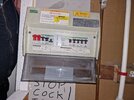The regulations are here I have read through them, and like many laws it will require case law to clarify what they intended to say.
For example
“qualified person” means a person competent to undertake the inspection and testing required under regulation 3(1) and any further investigative or remedial work in accordance with the electrical safety standards;
it would seem clear some one who has passed the C&G 2391 would be considered as qualified, but it can also include others. But it states also
the private landlord must ensure that further investigative or remedial work is carried out by a qualified person
which seems to rule out DIY unless you can show you are a “qualified person”.
Had you done the remedial work before the inspection then it would have been different, however the changing of a consumer unit is notifiable which means in real terms your stuck, you can't repair it with DIY.
I gave the link to the law as it is rather open, in some ways, it states
“electrical safety standards” means the standards for electrical installations in the eighteenth edition of the Wiring Regulations, published by the Institution of Engineering and Technology and the British Standards Institution as BS 7671: 2018(3);
however the 18th edition also states the date when designs most comply (Note design not the date work is done) and that designs following previous editions are not necessary dangerous, so there is no requirement to upgrade old designs.
But we have two problems, one is BS 7671 may not be law, but in the main the changes necessary to maintain technical alignment with CENELEC harmonisation documents, and without reading all those documents no electrician can really know if a change is really required, and two often we get clarification rather than a change, and in doing so it may show what many were doing some years ago did not really comply, but they thought it did at the time.
New products do change what can be regarded as safe, when I was a boy we would clearly turn off power when changing a light bulb, as other wise we would burn our hands, but today light bulbs are much cooler, so we can easily touch them while the power is still on, only one example, but it points out why rules need to change.
So if I change the design of a circuit, by for example removing a MCB and replacing it with a RCBO it would need to comply with today's rules. And I would need to raise a minor works or installation certificate to say what I have done, and record the new test data. So I should not be reusing a plastic CU.
So doing it on the cheap = braking the rules. I am sure people brake the rules all the time. However what we also look at, is are we likely to get caught. So doing work on an owner occupied home no one is likely to complain, but in a rented home, in 5 years time some one will be scrutinising that work, being a scheme member is the only way to work on domestic, so no one in their right mind is going to do any work which could risk their scheme membership.
So I looked it up, a 8 way FuseBox F2020MX with all the RCBO's and SPD is £166.14 and not sure if right type, but a Crabtree RCBO is £27 to £40 depending on which ones will fit and that means still no SPD so you are talking about around £60 difference to do the job right or botch it up. OK there is also labour costs, but really you want an electrician to risk his livelihood to save you £60?
OK we can argue that maybe it should have passed, but that option is no longer open, so lets get down to brass tacks, you want some one to risk their livelihood to save you £60. God what sort of landlord are you?


